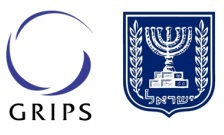
| Time | 13:20-18:00, Wednesday, 9th October, 2013 (17:00-18:00 Networking Party) |
|---|---|
| Venue | Sokairou Hall, 1F, GRIPS (7-22-1, Roppongi, Minato-Ku, Tokyo)(Access) |
| Sponsor | National Graduate Institute for Policy Studies (GRIPS), and Embassy of Israel in Japan |
| Language | Japanese and English (Simultaneous translation avilable) |
| Fee | Free (Preregistration required) |
Science and technology (S&T) sectors, both in Japan and Israel, are highly developed sectors. Due to the limitation of natural resources, the two countries have been putting emphasis on S&T as a basis of economic development. Consequently, both countries share many features. The percentage of scientists and engineers per capita, the percentage of published scientific articles, the expenditure on research and development (R&D) in relation to gross domestic product (GDP), are notably very high in both countries.
It is well known that Israel produces a lot of start-up companies providing groundbreaking technological solutions. Israel is considered a hub on the global innovation map, offering excellent researchers, platforms (e.g. incubators and accelerators) for investors and entrepreneurs and many technological R&D centers. Israel has also proved high-ranking performance in high technology, especially in the fields of information and communication technologies, life sciences and clean technologies.
The development and the image of Israel as a "Start-up Nation" is based on various factors such as academia-industry synergy; a large investment on R&D; centers of excellence led by outstanding scientists; easy access to incubators and investors; immigration policy; and the utilization of the military service as a lab, think tank and catalyst for innovation. These factors enable Israel to develop its unique culture which encourages entrepreneurship even under severe conditions. Being attracted by its innovation friendly features, many global companies, such as Apple and Intel, open R&D centers in Israel. Samsung and other Korean and Chinese companies are also setting a foot in the country. Even though the presence of Japanese companies in Israel is still limited, there is a high expectation in Israel in deepening the collaboration with Japan and Japanese companies.
On the other hand, Japan recently reexamines its economic revitalization strategy under Prime Minister Abe's administration. In "Japan Revitalization Strategy-Japan is Back" and "Comprehensive Science, Technology and Innovation (STI) Strategy," which were approved by the Cabinet in June 2013, STI is regarded as one of the pillars for the revitalization of Japanese economy. Both papers portray ambitious cross-ministerial medium and long term goals toward realizing the Motto "Most Innovation Friendly Country." From now, Japan will have to examine various tools in order to achieve its grand goals as presented in these strategies, thus make its STI system sustainable and competitive in the global environment. The Israeli constant efforts and experience might give Japan some insights in order to address these challenges. In addition, cooperation with Israel, a global innovation hub, may contribute to the revitalization of Japan's innovation system.
In this forum, participants from government, academia and industry of Japan and Israel will discuss and share views on challenges towards achieving a sustainable STI system as well as future prospect for realizing it through the mutual cooperation between the two countries.
Master of Ceremony: Prof. Atsushi Sunami, Associate Professor and Deputy Director of GRIPS Innovation, Science and Technology Policy Program (GIST) National Graduate Institute for Policy Studies (GRIPS)
| Time | Sessions |
|---|---|
| 13:20-13:30 |
|
| 13:30-14:45 |
|
| 14:45-15:00 | Adjourn |
| 15:00-15:40 |
Panel Discussion
"How to Promote Innovation and International Industrial Cooperatiojn - Opportunities and Challenges - "
|
| 13:20-13:30 |
|
| 17:00 - 18:00 |
Networking Party |
Please register at the Registratiion Form operated by the Embassy of Israel in Japan by October 4th.
In case of over-registration, seats will be allocated by lottery
Contact
Embassy of Israel in Japan (Ms. Motoko Sugase)
E-Mail:press@tokyo.mfa.gov.il
TEL: 03-3264-0392 (Time in 10 a.m.-5 p.m. )